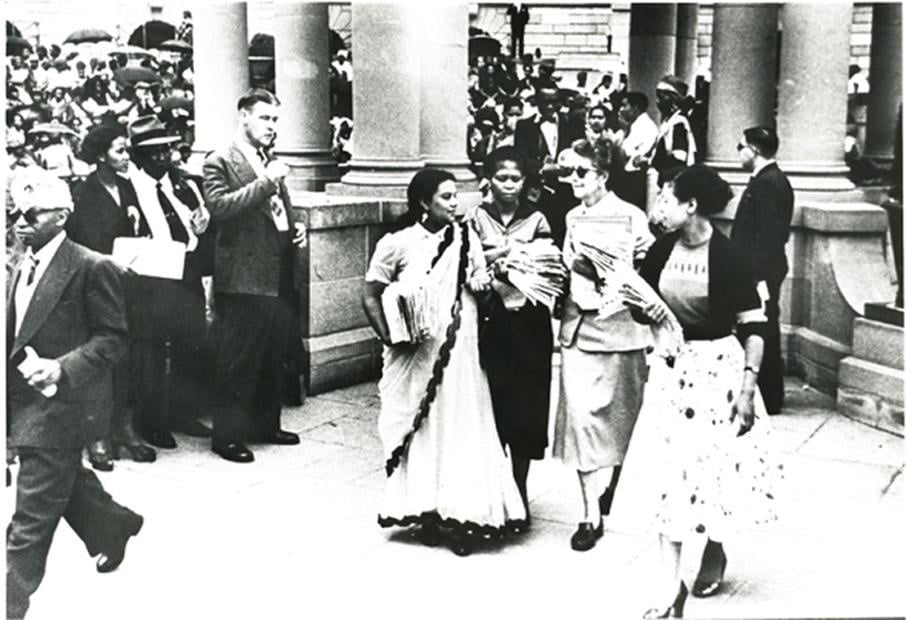
One of the greatest contributions of the generation of women of 1956 was protesting against the repugnant pass laws with a persuasive force of will and unbreakable courage to lawfully reclaim their dignity and fundamental freedoms, writes Thelela Ngcetane-Vika.
Year after year, the slogan "you have tampered with the women; you have struck a rock" reverberates across all parts of South Africa as we honour the thousands of women who descended on the Union Buildings in Pretoria at the height of apartheid on 9 August 1956. No amount of intimidation could deter these women warriors from their determination to face the Goliath of that era as they bravely marched to the brutal apartheid regime's seat of power.
In its form and design, apartheid was the antithesis of justice and equality. These daughters of the soil understood their role in the fight against the immoral system of apartheid – to stand up against all forms of discrimination and injustice. Because historical interpretation has often played up the role of predominantly white male leadership while playing down the role of leaders of colour and, in particular black women, our understanding of history has been skewed, as it is not told through her story. This often leads to a distorted understanding and interpretation of our history.
Essentially, this notion of historicism and biases has to form a critical frame of reference in our endeavours to tell #herstory. It is from this perspective that the contribution of black women's struggles must be elucidated through continuous interrogation.
As we commemorate Women's Day on 9 August 2023, I think it is poignant to develop a deeper understanding of the difference and connections between nostalgia, commemoration, and remembrance. No doubt, remembering as a revolutionary act has its significance, not just for the sake of history but also for the urgency of now – to inspire the women of this country to take bold and unwavering action against current injustices.
Remembering is honouring, and honouring is actively, boldly and courageously walking in the footsteps of those who laid it all for us to have a just and equal society, putting ourselves at the disposal of the power of memory to take the necessary steps forward. This moment, right now, is calling us to advance the economic dreams of our people.
The search now should be for a more balanced interpretation, which includes striving to put many forces and multiple players in proper balance and perspective. That, I think, is what is at issue with regard to this momentous question: what are the lessons from the 1956 Women's March to this current generation?
READ | SATURDAY PROFILE: 1956 Women’s March organiser Sophia Williams-De Bruyn: 'Govt today is lackadaisical'
It was the brave leadership of women like Lilian Ngoyi, Sophie de Bruyn, Albertina Sisulu and Winnie Madikizela-Mandela, among others, that led to that historic march. The spectacularly successful Women's March was, and still is, one of the most significant moments in the history of the liberation struggle in South Africa. They, in my opinion, did not have room to indulge the unhinged apartheid and patriarchy.
Global significance
As such, the 1956 Women's March was of global historical significance as the world was watching. Moreover, the bravery of the 1956 Women's March signalled a seminal moment in women's struggles and, indeed, in the anti-apartheid movement. It was a clear demonstration by black women that they would not tolerate discrimination and unjust laws affecting every facet of African people's lives. They unequivocally rejected the repugnant apartheid laws that diminished the humanity of black people in South Africa, and black women in particular. It bears remembering that their march happened during the most brutal era of the apartheid apparatus, so it was no small measure of revolutionary bravery.
Clearly, the anti-apartheid movement would not have been possible without mass democratic movements, global boycotts and condemnation, nor without the support of the working class, women and international pressure as many were detained and brutally killed. One of the greatest contributions of the generation of women of 1956 was protesting against the repugnant pass laws with a persuasive force of will and unbreakable courage to lawfully reclaim their dignity and fundamental freedoms.
Women leaders brought us closer to fundamental freedoms
It is worth noting that black women's leadership precedes the 20th Century as women like Nonesi of AbaThembu led her people during the difficult days of the colonial epoch in the 1800s. Faced with Pharaohs from both sides of the river - sexism from her own people and annexation by the whites - she fought to assert her role as a legitimate leader. More than once, she was able to save her people from losing their land through her negotiation and diplomatic skills. She died in 1880, at the age of 65, after leading her people for almost 40 years.
Notably, the advancement of women's struggles and rights was brought to the fore by women leaders like Charlotte Maxeke and Nontsizi Mgqwetho, who began the protest around 1918. The 1956 generation took this struggle forward as they organised the biggest march of their times. They put their bodies on the line to end the repression of women’s rights and declared the unjust laws of that time null and void. They brought us closer to our fundamental freedoms, which are the backbone and core values of our democratic society, underpinned by the principles of non-discrimination and equality. No doubt, their courage shaped 20th and 21st Century women's rights activism and gave us victories that propelled us to develop progressive policies and legislative interventions to give women their rights and voices. Thus, we owe a great debt to the generation of 1956.
READ | OPINION: Human rights are women's rights, and women's rights are human rights
As I was ruminating on the struggles of black women, a thought visited my mind that it was on the 1 August 1985 that one of the pioneering black women human rights lawyers, Victoria Mxenge, was brutally assassinated. Her memory is also a blessing as she represented many of our people in court, sometimes as an outlaw herself. She paid the ultimate price, reminding us that our freedom was not free, as many of our people paid the ultimate price.
Women across the globe have continued to challenge discrimination and injustice in their own countries. In the US, for example, women like Fannie Lou Hammer and Rosa Parks, through various campaigns and protests and their refusal to accept second-class citizenship, served as an incubator of the African American women's struggles, rooted in non-violent revolution and the continuing project of freedom for all. That struggle continues; as Coretta Scott King aptly noted: freedom is never really won as every generation must win it. South African women, too, are on this life-long struggle against injustice.
Clearly, many factors must be considered, including equality for all in every sphere of our societies. Essentially, our society must advance the economic dreams of our people, fight the scourge of gender-based violence (GBV) that is rampant in present-day South Africa and bring an end to all forms of suffering, including the high rates of unemployment and poverty. Progressive, liberatory movements seeking to revive the politics of integrity, honesty, decency, accountability, dignity and courage should embark on continuous projects until justice is attained for every member of SA society. For those of us who are believers, the politics of faithfulness to God's call for justice is as noble and crucial as ever.
- Dr Thelela Ngcetane-Vika, is a corporate governance and leadership scholar, management and social scientist.
*Want to respond to the columnist? Send your letter or article to opinions@news24.com with your name and town or province. You are welcome to also send a profile picture. We encourage a diversity of voices and views in our readers' submissions and reserve the right not to publish any and all submissions received.
Disclaimer: News24 encourages freedom of speech and the expression of diverse views. The views of columnists published on News24 are therefore their own and do not necessarily represent the views of News24.




 Publications
Publications
 Partners
Partners
























